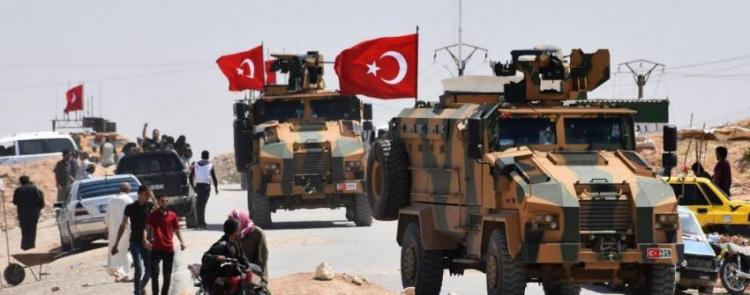Turkey s ambitions in Syria, successive losses amid limited options
Cairo – North-Press Agency
Muhammad Abu Zaid
Turkey is surrounded by many challenges and obstacles which stand against its ambitions in the region. This is true especially in the two strategic places which Turkey focuses most on, Syria, in which Turkey has early intervened through its unlimited support for armed opposition groups, and Libya, where its officially announced direct support for the Government of National Accord and its ‘militias’ in Tripoli. Whether in Syria (specifically in Idlib in northern Syria) or Libya, Ankara's successive losses have put it in a critical situation and in the face of limited options.
Likewise, in the face of these problems, Turkish President Erdogan and his ruling Justice and Development Party (AKP) have received domestic and international criticism, and have ended up operating without internal or external support, to reinforce its positions or attitudes in Syria and Libya. Despite the recent Russia-Turkey Ceasefire Agreement, analysts stated that Turkey has only ‘limited’ options in Syria, which are entirely within the framework of strategic retreat, on the basis that any escalation will not in any case be in its favor.
Temporary solutions
According to the Egyptian military expert, Major General Nasr Salem, "the numbing solutions for the situation in Idlib, whether by the ceasefire agreement, armistice, calm, or joint patrols, all do not serve Turkey's interest in the end, because the Syrian army will never give in on the liberation and control of Idlib, which in turn would make the recently agreed ceasefire as fragile."
The Egyptian strategic expert stressed, at the same time, that both Turkey and Russia have only "defused the crisis" between each other temporarily, and only agreed on a ceasefire for the sake of calm, while the main problem has not yet been solved. This does not mean that either party has changed its attitude.
He added, "The Syrian government will not sacrifice Idlib, and the ceasefire does not mean a Russian-Turkish consensus, as each has differing goals, and this is natural, Erdogan on his part, does not want to leave Idlib, and wants to secure his interests and the areas under his control on the Syrian-Turkish border."
Turkish dispersion
"Turkey is exhausted on two strategic fronts in which it is fighting, in Syria and Libya," said the Egyptian strategic expert Maj. Gen. Samir Faraj, who mentioned that the losses inflicted on Turkey on both fronts put it in a very difficult situation, which it will not be able to continue or escalate.
He stressed that Turkey, in light of the losses suffered in Syria and Libya, would be compelled to accept the political solutions, negotiation and a truce, because Turkey is well aware that any further escalation will not be in its favor in any way. This is because it is in a weak position, particularly as it stands alone after Europe and NATO have largely abandoned it, and after Ankara’s aspirations and actions became clear in Syria and Libya.
Meanwhile, Ankara is still trying to play all of its cards in order to try to improve its position in both Syria and Libya after the recent developments and losses it has suffered, and thus, it is using the refugees to blackmail Europe, which is the strategy that Maj. Gen. Faraj emphasized that Ankara adopt in an attempt to recoup its losses in one way or another.
Turkey's goals
The Syrian opposition politician and former member of the Syrian National Coalition SNC, Samir Nashar, indicated in a statement to North-Press, that "Turkey is trying to keep a safe zone along the Syrian-Turkish borders, including Idlib, at a depth of 30 kilometers, something it couldn't manage to achieve previously when it signed the Syrian-Turkish Adana Agreement in 1998. The agreement didn't dispel its concerns about the possibility of a western-backed Kurdish entity that threatens the Turkish national security."
He added: "Turkey is also trying to prevent the displacement of the Syrians from Idlib province to stop the gathering of the displaced people at the Syrian-Turkish borders, who number between one and one and a half million, most of whom are in the open or in tents, and would prefer to live in the wilderness than to return to the rule of the Syrian government. The displacement of the Idlib population means raising the number of the displaced to more than two million people. The Turkish border crossings were closed in front of them, as this will constitute a humanitarian catastrophe and an ethical scandal for Turkey and the international community."

